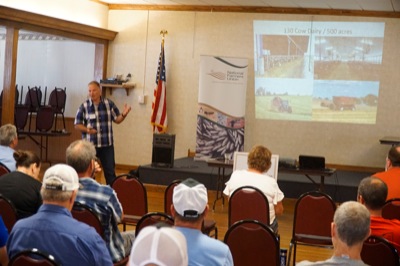Wednesday, August 29th, 2018
Canadian dairyman talks in Maria Stein
Local farmers attend event
By Ed Gebert

Photo by Ed Gebert/The Daily Standard
Dairy Farmers of Ontario Vice Chairman Murray Sherk describes Canada's dairy marketing system. Sherk was the featured speaker at Tuesday's Dairy Together event in Maria Stein.
MARIA STEIN - About two dozen dairy farmers and guests gathered on Tuesday in Maria Stein to learn about the Canadian dairy supply-management system to see if it could help prop up America's plummeting milk prices.
Several local dairies have closed due to the falling prices, and the trend is not unique to west-central Ohio. U.S. Department of Agriculture efforts to improve dairy farmers' safety net have failed to sustain milk prices, and farmers say their income does not cover their expenses.
The USDA recently changed its federal safety net program to better help U.S. dairy farmers dealing with low milk prices.
Dairy Farmers of Ontario Chairman Murray Sherk, the featured speaker at the Dairy Together event, said the Canadian system gives producers control over pricing. Provincial dairy farmer boards, whose members are elected by the farmers, purchase the milk from the farmers and then sell it to processors. Processors then sell it to retailers, who set the prices in their stores.
In this way, Sherk said farmers receive a fair return based on the marketplace and capital and labor costs, and processors are provided a stable supply of milk so they can plan their production each year. The consumers then are provided with a consistent supply of milk and milk products at a fair price.
The key to the model is production discipline, Sherk said. Farmers have a quota of milk they can sell. The quotas are adjusted as needed.
"The three pillars of supply management: producer pricing, production discipline and import control," Sherk said, noting the pricing cycles typical in American dairy farming do not exist with supply management.
Ohio Farmers Union President Joe Logan compared milk overproduction to factory situations.
"If Ford or Chevy is making too many cars, they shut down a plant for a while. If we are manufacturing too much steel, U.S. Steel shuts down a shift on the production line," he said.
Overproduction, however, is driving some farmers out of business. Ten dairy farms in Mercer and Auglaize counties have in recent months closed or liquidated all or a significant portion of their herds due to low milk prices, local agriculture officials have said.
Logan said changing the way milk is marketed must be seriously considered, and talking about it is a good first step. Dairy Together events have been held throughout the Midwest to get dairy farmers talking. Logan said he and Sherk have conducted a series of events in Wisconsin and Michigan, forming bridges with regional dairy organizations.
Logan said he also wants dairy farmers to petition their elected officials.
"Make plans to visit your senator and your congressman," he said. "They are still talking about the farm bill, and maybe they should be looking at other solutions for local farmers."
Logan said he was pleased with Tuesday's turnout, "but I really would have liked to have a rainy day to get farmers in here to consider this."
Audience members were anything but passive, often interrupting Sherk with questions about the particulars of Ontario's quota system and about the similarities between Ontario farming and Ohio farming.
"There was extreme interest, great discussion and great questions brought up," Logan said. "And the situation with tariffs, I think we can see that it isn't all the fault of Canada, as they produce only a fraction of the milk produced in the United States. There's got to be a better way."
Logan said anyone who was unable to attend Tuesday's Dairy Together meeting and would like to set up another should contact the Ohio Farmers Union, the National Farmers Union or the National Farmers Organization. The Ohio Farmers Union also has a video presentation of Sherk's talk to help get farmers interested.


